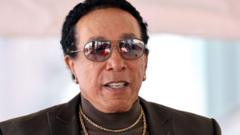Over the past year, the Trump family has embarked on various international real estate ventures, often entailing collaborations with foreign governments that have raised significant ethical questions. Nevertheless, a particular project in Serbia has spurred a public criminal investigation of local officials after a determined group of preservationists confronted both their government and associates of the influential American president.
Jared Kushner, the son-in-law of President Trump, is overseeing plans for a half-billion-dollar hotel and apartment complex situated in the heart of Belgrade. The development also enlists the Trump Organization, managed by Trump’s sons, Eric and Donald Jr., with the construction set to feature the Trump brand prominently.
Following President Trump's re-election in November, the Serbian administration facilitated the project's launching by declaring that the site — a dilapidated building that symbolizes the nation’s pain from the 1999 conflict — was no longer classified as a culturally protected site. This move was seen as a necessary clearance for the Trump family's ambitious project.
However, numerous architects and cultural historians from Serbia's state-run Republic Institute for the Protection of Cultural Monuments immediately voiced their opposition, contending that the government's actions violated legal protections for the historical site. Shortly thereafter, they penned a letter asserting that the revocation of the site’s protected status required expert approval from the institute, which had not been sought.
Estela Radonjic Zivkov, a former deputy director of the institute, remarked, “From the beginning, we knew it was a political decision.” She disclosed that she faced pressure from state intelligence to refrain from challenging the government's stance, emphasizing the scrutiny surrounding this contentious development. Despite the risks, she voiced her opposition publicly, indicating the high stakes involved in the project.



















